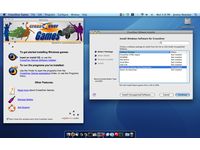Wine Matures to Version 1.0, Finally
After 15 years in development and beta testing, Wine 1.0, an open source implementation of the Windows API, was released this week by WineHQ.
For those not familiar with the Wine project, Wine is not an emulator (such as Parallels), and is not part of a dual boot system (such as Apple’s Boot Camp). Wine’s developers describe Wine as “a compatibility layer for running Windows programs”.
The differences between Wine’s “compatibility layer” status versus an emulator or dual boot are significant. Most notably, Wine can run Windows programs on Unix based operating systems without installing (and without needing to purchase) Windows. Also, since it’s not an emulator, every command sent to the processor does not have to pass through an interpretation layer, enabling Wine to operate faster than emulators. And, since it’s not a dual boot, Windows programs can operate with the underlying Unix based operating system still available without rebooting.
Of course, even though Wine is now stable, it’s not perfect. There are some Windows applications that it runs quite well, some that it runs with acceptable issues, and some that it does not run well enough for the programs to be usable. To help guide users in knowing what to expect, and let developers know where issues still exist, the Wine project maintains the Wine Applications Database. For business applications, Wine can also be a great path for OS transitions. Many IT managers who are thinking of making the switch to a Linux setup, can benefit from Wine’s cross platform support.
Wine has official builds available for multiple Linux operating systems. There’s no official Mac build yet, but options for installing Wine on Mac OS X are available in the Apple section of the Wine Wiki FAQ. Another option is Codeweaver’s CrossOver line of products, which are commercial versions of Wine, available for both Mac and Linux. The CrossOver products include enhanced support for many Windows programs, and technical support (something that you obviously don’t get with the open source freeware version of Wine). You can read more about CrossOver Mac in our Macworld 2008 coverage.
It will be interesting to see how Microsoft reacts to the Wine 1.0 release in the coming days and weeks. In our opinion, Microsoft’s best reaction would be no reaction at all. As an open source project, Wine has no advertising budget.
If Microsoft goes on the attack, the Wine project will end up with some much needed free publicity. Further, there’s the political issue. Regardless of which party wins the Presidential election, January will likely bring a new Attorney General and new goals for the Justice Department. If Microsoft comes across as restricting where its applications can run, it might once again raise the monopoly issue. It would be a poorly thought out decision to awaken an essentially dead issue, particularly when Microsoft has no real idea as to the name of the Attorney General or the goals of the Justice Department that would end up prosecuting a new case.
Get Tom's Hardware's best news and in-depth reviews, straight to your inbox.
-
jhansonxi It helps with legacy apps but still has a lot of problems. Like the article says it's not an emulator so it won't work with non-x86 processors like the older PowerPC-based Macintosh. There is a project named "Darwine" that combines Wine with QEMU to get it working on those (but with the obvious performance penalties).Reply
With the alpha releases the developers didn't care much about new features breaking it but with a 1.0 release they should be more concerned with regressions now (only time will tell). Wine-Reviews has reviews and news about various Wine-related projects. There is also a mailing list.
Installing Windows apps can be difficult but projects like Wine-Doors and PlayOnLinux are developing front-ends that automate the installation of popular apps and games. Still there are many apps that don't work correctly or completely but many popular ones are supported. It is getting compatible enough that the developers are concerned that Windows viruses may become a problem.
It doesn't use any Microsoft code so there is no copyright or licensing threats. There may be patent issues but that's no different then any software in the current US patent system. -
MooseMuffin Wine is an incredibly ambitious project, and it blows my mind that it works as well as it does. It runs WoW as well as windows does, and I downloaded portal through steam and played that too. Congrats to the wine team on 1.0!Reply -
skittle "There are some Windows applications that it runs quite well, some that it runs with acceptable issues, and some that it does not run well enough for the programs to be usable."Reply
And some that do not work, or do not install. -
jhansonxi Some compatibility problems are caused by DRM. Wine is compatible with some DRM schemes but others will fail to detect an original disc and require a NoCD patch.Reply
With winecfg you can change the Windows version that Wine is reporting to an app. This doesn't change Wine's behavior but some apps act differently with different Windows versions and may work better with something other than the default Windows XP. -
randomizer skittlenotably adobe CS3 and office 2007 still have MAJOR issues.That's why you run Open Office :kaola:Reply -
martel80 "If Microsoft comes across as restricting where its applications can run, ..."Reply
Yeah, they can modify the license agreement on their products but they can't do much about software they didn't create. The only Microsoft application that I would like to use through Wine is Visual Studio. -
Darkk It's Microsoft's best interest to make Office products easy to work in Wine. It still sells more office licenses even though users prefer Linux than Windows. It'll be a question of application monopoly in the future when it is locked to a particular OS.Reply
Firefox is a good example of it's success by making it available in Windows, Linux and MAC with the same functionally and familiar looks and feel. Although some people do use IE6 in Linux via Wine.
Darkk

